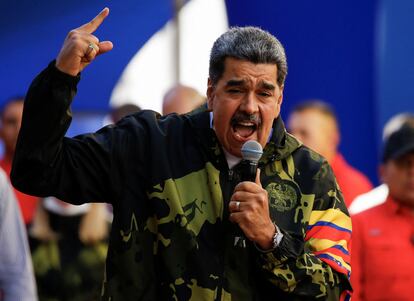Chavismo imposes its law
María Corina Machado, the opposition leader who was first in the polls, will not be able to face off with Nicolás Maduro due to a legal trick used by the government

The government of Nicolás Maduro has definitively barred the way for María Corina Machado’s participation in the presidential elections scheduled for this year. The veteran politician, who swept the Venezuelan opposition primaries held in October, has been disqualified for omitting food vouchers in an asset declaration dating back to 2015. The Chavista regime used this alleged irregularity to eliminate her from the campaign race, and on Friday the Supreme Court, which is the de facto judicial arm of the executive, confirmed her disqualification. The decision has also taken place in an atmosphere of heightened tension: last week authorities arrested more than 30 people accused of allegedly conspiring to assassinate Maduro and began a purge in the Army.
The sentence does not come as a surprise as it is a ruse that has already been applied in the past to leaders who were critical of the government, but it disrupts the agreements recently reached between Chavismo and the opposition, such as the Barbados deal. And most worryingly, it complicates the horizon of an election with guarantees. Machado has a conservative ideological affiliation, but she had managed to attract the support of the majority of the opponents of Chavismo, something that is not so common in a coalition — now called the Unitary Platform — that is very diverse and harbors deep political and strategic differences.
Her exclusion from the electoral process not only leaves anti-Chavista parties orphaned, but also makes it likely that we will be seeing more internal tension. There will be a sector that is suspicious of the possibility of participating in the race, another that is more open, and a third that will reject it without nuances. At the same time, there is no clear replacement for Machado, although some are already talking about Manuel Rosales, governor of Zulia (the most populous state in Venezuela), president of the center-left Un Nuevo Tiempo (A New Time) and former opponent of Hugo Chávez in the 2006 elections. In any case, it will be very difficult for the opposition to achieve the consensus and momentum of the disqualified candidate, who was leading all the independent polls.
With these premises, there are at least two other crucial factors to consider. First, it remains to be seen how international observation and EU participation in the election process will take shape. And second, we must consider the medium-term reaction of the United States, which gave a respite to the serious economic crisis of the Caribbean country by lifting some sanctions. After Machado’s disqualification, the U.S. government is already studying imposing them again.
But if this current devilish situation demonstrates anything at all, it is that, for the minimum conditions for change to be met, Maduro has to be willing to modify his authoritarian ways. Chavismo maintains control of the institutions, without any counterweights, and that is its main asset against its adversaries. Everything else, including holding elections, is a game won in advance.
Sign up for our weekly newsletter to get more English-language news coverage from EL PAÍS USA Edition
Tu suscripción se está usando en otro dispositivo
¿Quieres añadir otro usuario a tu suscripción?
Si continúas leyendo en este dispositivo, no se podrá leer en el otro.
FlechaTu suscripción se está usando en otro dispositivo y solo puedes acceder a EL PAÍS desde un dispositivo a la vez.
Si quieres compartir tu cuenta, cambia tu suscripción a la modalidad Premium, así podrás añadir otro usuario. Cada uno accederá con su propia cuenta de email, lo que os permitirá personalizar vuestra experiencia en EL PAÍS.
¿Tienes una suscripción de empresa? Accede aquí para contratar más cuentas.
En el caso de no saber quién está usando tu cuenta, te recomendamos cambiar tu contraseña aquí.
Si decides continuar compartiendo tu cuenta, este mensaje se mostrará en tu dispositivo y en el de la otra persona que está usando tu cuenta de forma indefinida, afectando a tu experiencia de lectura. Puedes consultar aquí los términos y condiciones de la suscripción digital.









































